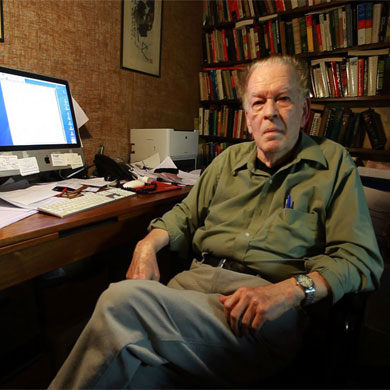
Gene Sharp (Seventh Art Releasing)
Gene Sharp holds a PhD from Oxford, has held research appointments at Harvard University’s Center for International Affairs, and is the founder and senior scholar at the Albert Einstein Institution. Where most academics’ work stays firmly within the halls of academia, Sharp’s work, especially From Dictatorship to Democracy: A Conceptual Framework for Liberation (1993), has had a profound effect on the world. The slim volume has given numerous people’s movements the tools to overthrow their oppressors, from Eastern Europe to Egypt.
How to Start a Revolution is first-time director Ruaridh Arrow’s documentary about Sharp and the global influence of his work. He examines the way in which From Dictatorship to Democracy has been used to help guide the resistance to and the overthrow of dictatorships around the world. The book’s essential premise is that the legitimacy of dictatorships, and governments in general, is built on certain pillars—the media, law enforcement, the military, and so on—and that rather than cutting off the head and going after the dictator, you undermine, co-opt, and coerce the pillars that support the leader, and naturally the regime will collapse.
There’s a lot How to Start a Revolution accomplishes, from creating more awareness of Sharp—who is relatively anonymous within the United States, at least outside of activist and academic circles—to providing excellent visuals that help explain and support his theses on nonviolent revolution. The film also does an excellent job of laying out his moral and principled point of view. However, it’s essentially a hagiography.
By trying to wholly sell one side without showing flaws and opposing voices (which here are merely the laughably loony Iranian and Venezuelan leaders who unfairly vilify Sharp in order to discredit his ideas), there’s never a feeling that his ideas are tested. There are certainly many good surface examples of how Sharp’s ideas have helped in many countries, but few go in depth into the real political machinery and how Sharp’s books have really worked in practice. Nor does it offer more than a fleeting glimpse of what happens when nonviolent revolution doesn’t work.
Sharp’s ideas are brilliant, but they’re not a universal mechanism for democratic change. As the documentary ends, it touches on Syria, which at the time of the film’s making was a part of the Arab Spring, but which now finds itself buried in the brutal repression of Bashar al-Assad. A more robust documentary would look at places like this or even the U.S., which is—for all intents and purposes—ruled by an oligarchy. What chance do we have here to overthrow the corporatist leadership in a nonviolent way?
How to Start Revolution already has a difficult mission: to introduce Gene Sharp’s philosophy and impact to a larger audience and to explain how his ideas work in the real world. But without allowing room for his critics and then time to answer them, it comes across as a bit too easy. As it is now, it’s an assemblage of different ideas relating to Sharp and his work at the Albert Einstein Institution, and not something of more substance.
This isn’t really a mammoth complaint. It is definitely a good documentary, and Sharp’s ideas do need a wider audience. It’s just that Arrow’s narrow focus hinders the true power of the film.






Leave A Comment